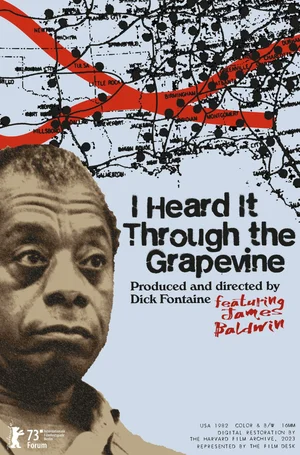
Film review: by BNimri Aziz Feb 24, 2024
Author James Baldwin was more than a brilliant novelist; he was a powerful speaker, a compelling debater and pithy commentator. His legacy includes many quotable insights. Those carry no hesitation, no hint of doubt in his mind. His mien adds to the resolve in his words.
Can we imagine this man in anything but a polemic context? Well, a newly rereleased film offers us that characteristically penetrating but a less emphatic James Baldwin. That’s how we find him in I Heard It Through the Grapevine, a 1982 production newly restored higher quality digital version. Marking the centennial birth of the author, it’s screening this month in New York City at the African Diaspora international Film Festival.

I Heard It Through the Grapevine is essentially a programmed road trip – a highly symbolic one. Baldwin is in conversation with his brother David on a 1979 journey, accompanied by two independent filmmakers employing a Cinéma Verité approach, as the brothers recollect 1960s Black activist history. In addition to Newark, Philadelphia and Washington they visit key sites of the Civil Rights Movement in the South.
Producers Pat Hartley and husband Dick Fontaine had been creating short films in England in the 1960s and managed to obtain newsreel outtakes of US events at that time, from Central TV, an independent British film company. (“Video materials from the BBC and American networks during that turbulent time of Black America’s freedom struggle in the US were unavailable to independent filmmakers”, she notes.) As enterprising artists often find, what they gathered proved to be of enduring, if not immediate, value. Those scrambled clips included discussions and rallies by individual African Americans in the heat of their struggles for justice. Such images may hardly differ from iconic clips replayed during African American History month. But interwoven with Baldwin’s revisit into that historical moment in I Heard It Through the Grapevine, they take on new resonance.

Inspired by this archival material, Baldwin had agreed to make that journey with the film team. Locating some of the same activists, individual men and women, from local journalists to SNCC members, Baldwin invited them to reflect together with him over what had transpired since a that unprecedented period teeming with hope and action. Modestly, the now famous Baldwin takes on the role of a passive observer, quietly engaging, reflective, pursuing questions about the outcome of their political work two decades on.
